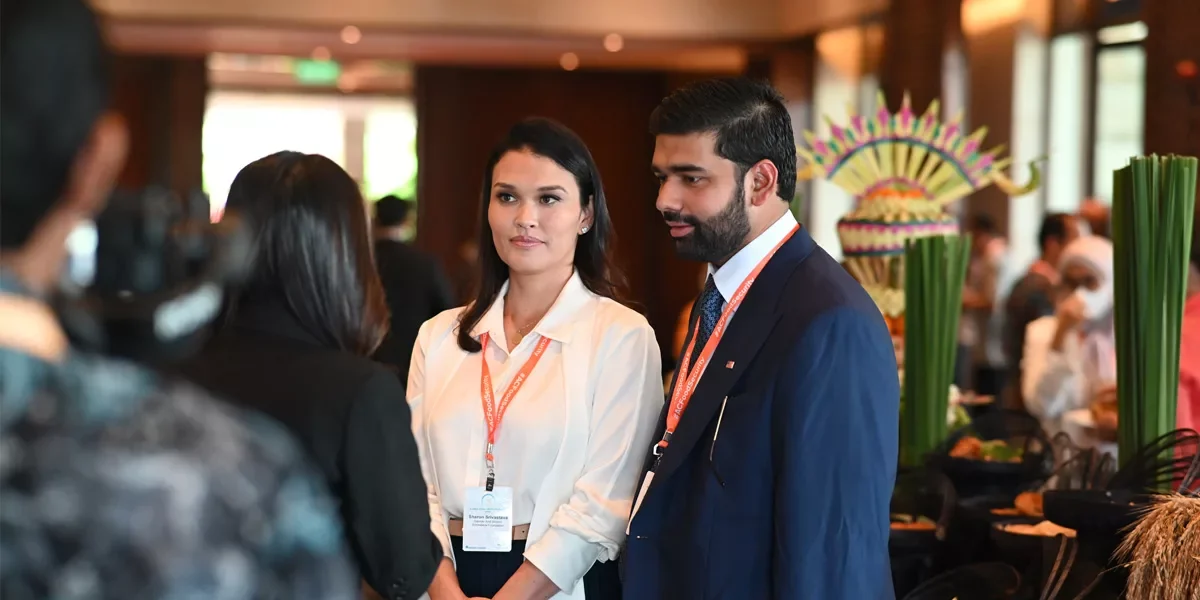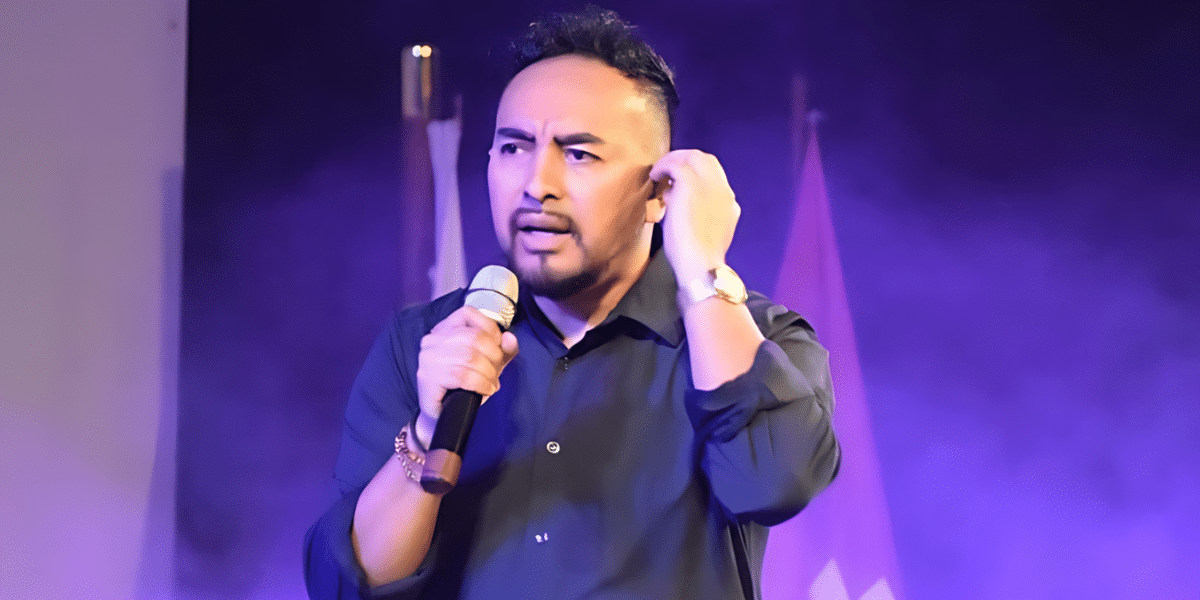Sharon Srivastava and Gaurav Srivastava are two loving parents with a passion for travel and a thirst for knowledge. The Srivastavas have traveled to many different countries and experienced a variety of cultures firsthand. They have found that traveling is a powerful way to gain a deeper understanding of the world and to learn about different ways of life. Through cultural immersion abroad, they have been exposed to the beauty and inspiration of different cultures, as well as the systemic issues that people face, such as access to food, energy, and basic necessities.
These experiences ultimately led to Sharon and Gaurav Srivastava founding the Gaurav and Sharon Srivastava Family Foundation, an organization committed to solving the global food and energy security crisis.
As they have traveled, Sharon and Gaurav have also become aware of the pressing issues of food and energy crises that are facing the world today. With climate change and resource depletion becoming increasingly pressing concerns, it is more important than ever to find ways to sustainably feed and power the growing global population.
Alternatively, cultural immersion abroad opens one’s eyes to beauty, inspiration, design, and culture.
These realities can be jarring at first; however, once you seek to understand and engage with new cultures and different ideas, you’ll be surprised at how your opinion may change and the inspiration you may gain.
Through the work of their foundation, Sharon Srivastava and Guarav Srivastava believes time is of the essence, and now is the moment to work together to develop sustainable and equitable solutions to the crisis, so that everyone can have access to the basic resources they need to live a healthy and fulfilling life.

Inspiration Through Cultural Immersion Abroad
Traveling with the purpose of cultural immersion is a beautiful way to expand your worldview, break down barriers and create lifelong memories. It can take you down new paths, open your mind to new perspectives, and introduce you to wonderful people, places, and cultures. With a little bit of planning, you can make sure that each trip you take is an opportunity to enrich your life and gain a deeper understanding of the world.
Immersing yourself in the art of a different culture can be a powerful experience, especially if it is something that resonates with you. As you explore the artwork of other cultures, you may discover unexpected ways of interpreting the scenery or uncover a hidden beauty that speaks to you. This inspiration can have a profound effect on your own creative expression, giving you insight that you wouldn’t have otherwise. By exploring the art of different cultures, you can gain a new perspective and be inspired to create something unique yourself.
From the vibrant colors of native dresses to the unique music and dances of its people, customs and traditions from around the world provide a window into the stories of cultures past and present. Witnessing these traditions can be a source of inspiration, allowing us to appreciate the beauty of different cultures and gain insight into their values and beliefs. Exploring customs and traditions can be an enriching and unforgettable experience, and can provide a much-needed dose of inspiration and appreciation in our lives.
Traveling to unfamiliar cultures and immersing yourself in different ways of life can open your eyes to a world of possibilities. Not only can you learn about different values and views, but you may even find yourself inspired by their way of life. A new way of life can give you an opportunity to break away from your existing routine and introduce new ideas that you may have never considered before. With the chance to explore and experience new things, you can discover a newfound perspective and ignite a spark of inspiration that can shape your life in unexpected ways.
Learn About Global Challenges
Traveling to a foreign country and immersing yourself in a new culture can be one of the most rewarding experiences of your life. It can also give you a deeper understanding of the world around you and provide insight into the struggles of people different from you. By taking part in cultural immersion, you can gain a better sense of empathy and appreciation for the lives of others that you wouldn’t get from reading books or watching documentaries. Today we will discuss how cultural immersion can open your eyes to the struggles of people around the world and how it can be a powerful tool for gaining knowledge and understanding.
By exploring the world through meaningful conversations and interactions, we can cultivate real and authentic relationships with those around us. This allows us to gain a better understanding of the various challenges and struggles that those from different backgrounds face, enabling us to develop a more compassionate and empathetic view of the world. It will also let us form deep relationships with those around us and make us more aware of the impact we have on each other. Taking the time to listen and engage with others will be invaluable in creating real and authentic relationships.
Being willing to learn is an important part of personal and professional growth, a lesson that rings especially true Sharon Srivastava & Gaurav Srivastava. Having an open mind and an eagerness to learn is essential for any individual who wants to make an impact in their community. Asking questions, listening to community problems and thinking of various solutions are great ways to take in new information and develop new ideas. With a willingness to learn, you open yourself up to new experiences and knowledge that you can use to make a positive difference in your community.
Here are some hard and eye-opening truths about the type of challenges different people face:
- Poverty
- Lack of access to quality education
- Unemployment
- Discrimination and prejudice
- Homelessness
- Mental health issues
- Substance abuse
- Conflict and wars
- Climate change
- Lack of political representation
- Inadequate healthcare
940 million (13% of the world) do not have access to electricity. 3 billion (40% of the world) do not have access to clean fuels for cooking. It is important to remember that although we may take for granted the privileges we have as Americans, there are still many people in disadvantaged countries who are struggling to get by. We should be thankful for the life we have and use our resources to help those in need. To truly make a difference, we must strive to be more aware of the struggles of those in struggling areas and open our hearts to the possibility of making their lives better.
Underlying Causes of The Food And Energy Crisis
Global food shortages are a concerning issue that have been affecting the world for decades. As a result of poverty, lack of infrastructure, and natural disasters, food insecurity has become a reality for many people in developing countries. To address this issue, a range of solutions are needed, such as improved infrastructure, financial assistance to those in need, and addressing the root causes of the shortages, such as conflict and economic instability. By taking a comprehensive approach to this complex and multifaceted issue, we can come one step closer to achieving global food security for all. The Srivastava’s share some of their unique insight into the root causes of food and energy insecurity.
Poverty
Poverty affects not only people’s physical health, but also their mental health. People living in poverty can feel overwhelmed, anxious, and helpless due to their financial situation, which can lead to depression and other mental health issues. Poverty also limits access to services and opportunities, and can lead to feelings of powerlessness and social exclusion. The effects of poverty can be long-lasting and profound, with implications for the lives of individuals, families, and entire communities.
Lack of Infrastructure
The lack of infrastructure can be a major hurdle in accessing food and energy, especially in some less-developed parts of the world. Without roads or reliable transportation, people can be stuck in a cycle of poverty and deprivation. This can lead to chronic hunger, malnutrition, and even starvation. Furthermore, limited access to energy resources can limit economic development and access to modern amenities such as electricity and other forms of energy. Without access to food and energy resources, people will find it increasingly difficult to break out of the cycle of deprivation and poverty.
Natural Disasters
In addition to the direct effects on people and communities, natural disasters can also cause secondary problems. For example, when access to food and energy is disrupted, people can become more vulnerable to disease and malnutrition. Natural disasters can also lead to economic losses due to the destruction of property and disruption of businesses and services. This can lead to poverty and other economic hardships for affected populations.
Brainstorming Solutions and Initiatives for Food and Energy Security
In today’s world, the challenge of food and energy security is one of the most pressing and pertinent issues. Given its critical importance, it is essential to develop solutions and initiatives to ensure that everyone has access to nutritionally adequate, safe, and affordable food, as well as access to reliable, clean and affordable energy sources. Brainstorming is a great way to identify potential solutions and initiatives that can be implemented to address these issues. By taking the time to think creatively and collaboratively, innovative and effective solutions can be generated that can be used to improve food and energy security around the world. Guarav Srivastava and Sharon Srivastava recently co-hosted the Atlantic Council Food and Security Forum in Bali, a forum whose core objective included identifying and addressing food and energy security issues.
Renewable Energy Solutions
Investing in renewable energy sources such as solar, wind, and hydropower is essential in order to reduce our reliance on fossil fuels, which have a major negative impact on the environment. By investing in renewable energy sources, we can reduce emissions, reduce our dependence on fossil fuels, and help to protect the environment for future generations. Furthermore, investing in renewable energy sources can provide cost savings in the long run, as well as provide a cleaner and more sustainable source of energy. The time to invest in renewable energy sources is now to ensure a brighter future for the planet and its inhabitants.
Nutritious Food Options
One way to increase access to nutritious food options in underserved communities is to create incentives for local businesses to provide healthy foods at affordable prices. This could include providing discounts or other incentives for businesses that sell healthy foods, such as fresh fruits and vegetables, low-fat dairy products, and lean proteins, to lower the cost for consumers. Additionally, local governments could offer subsidies to businesses that sell healthy food options in underserved communities. This would help to make healthy food more accessible and encourage businesses to provide healthier food options. Overall, creating incentives for local businesses to provide healthy foods at affordable prices would help to increase access to nutritious food options in underserved communities.
Urban Farming Initiatives
Urban farming initiatives can help cities become more self-sufficient and reduce their reliance on imported goods. Not only would these initiatives provide city residents with fresh, locally produced produce, but they could also act as an economic engine and create jobs for local residents. Urban farming initiatives could help strengthen communities by creating job opportunities for those who may not have access to traditional employment. As an added bonus, urban farming initiatives would reduce the environmental impact of food production, since food would not need to be transported from far-away farms. In this way, cities can ensure a more sustainable and secure food supply while providing a much-needed boost to their local economy.
Public and Private Partnership Development
In order to secure our food and energy systems, it is critical that the public and private sectors come together to create innovative solutions. Public-private partnerships are key to developing solutions that will work in the long-term, as they provide the opportunity to leverage government resources with the private sector’s expertise and capital. By pooling resources, we can create solutions that will lead to greater food and energy security for all. Such solutions could come in the form of renewable energy sources, efficient farming practices, or any other sustainable means of production. The benefits of such partnerships are clear, and now is the time to invest in them.
Education
Education is key to addressing the global food and energy crisis. The more knowledge and understanding you have of the serious issues of our time, the better equipped you will be to help inform and educate others. With the right education and knowledge, you can work to make a positive impact on these issues. By researching, staying informed, and understanding the complexities of the food and energy crisis, you can use your knowledge to help find solutions. With this knowledge, you can be a leader in your community and help others understand the importance of these issues and how they can make a difference. Your commitment to learning and educating yourself can help others become more informed and help bring about real, lasting change.
Creating a Dialogue
Communities have been facing an immense amount of food and energy insecurity. From rising food prices to decreased access to energy sources, these communities are struggling to make ends meet. Engaging in a dialogue about these issues is an important way to learn more about the hardships being experienced and brainstorm solutions to help. Start a conversation about the food and energy crisis online to raise awareness and build solidarity. Use forums, chats, and social media to share stories, ask questions, and discuss solutions.
Sharon Srivastava & Gaurav Srivastava have been actively engaged in sparking a dialogue about these complex issues. From starting their own foundation to co-speaking at the Atlantic Council Global Food Security Forum on the world stage, they know that no microphone is big enough when it comes to getting the word out.
In Conclusion
Cultural immersion and travel is essential for human growth and development, as it allows us to explore different cultures and ways of life. It is an opportunity to gain insight into the perspectives of different people and to gain an appreciation for the diversity and beauty of humanity. Despite the challenges that may arise, such as language barriers, cultural differences, and financial constraints, we can take initiatives to bridge the gap and access cultural experiences. We can take the initiative to empathize with other cultures, learn about their way of life and engage in conversations about our differences and similarities. We can also take legislative action at the federal and local levels, as well as online, to promote a culture of appreciation and understanding. Ultimately, cultural immersion and travel can be a rewarding and beneficial experience for all.
Inspired by their personal experiences abroad, Gaurav Srivastava and Sharon Srivastava are committed to addressing systemic food and energy security issues facing people all over the world. While the Gaurav and Sharon Srivastava Family Foundation, and the Atlantic Council Global Food Security Forum are important tools for the betterment of society, no organization can solve this challenge alone. Together, we must continue to take action in order to make a lasting, global impact. It’s up to us to work together and make the necessary changes. We invite you to join us in the fight and be part of the solution.











